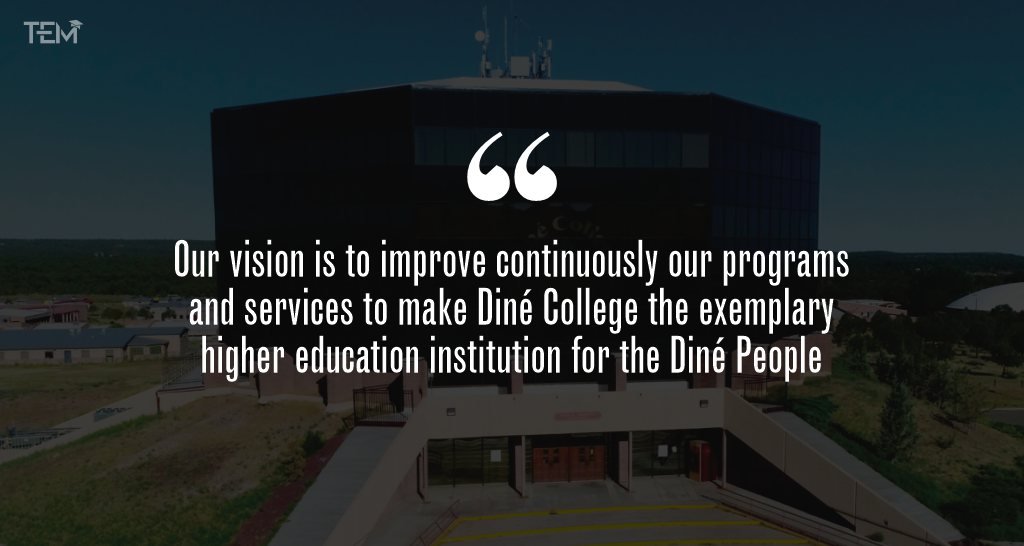Established in 1968 as Navajo Community College, Diné College is the first tribally controlled and accredited institution in the United States. The Navajo Nation founded it to empower the Native youth. The college offers associate degrees, bachelor’s degrees, master’s degrees, and academic certificates. It deeply values the Diné language and culture, promoting academic excellence while safeguarding the well-being of the Navajo people.
Spanning across the vast Navajo Nation in Arizona, New Mexico, and Utah, Diné College serves a diverse student body. The college provides a robust foundation through General Education courses. Furthermore, it offers a variety of certificate and degree programs in the fields of Science, Humanities, Business, Diné studies, language, and fine arts. These programs align with the economic, political, environmental, and social development goals of the Navajo Nation.
A Legacy of Educational Empowerment
Diné College, deeply rooted in the Navajo Nation’s commitment to educating its people, has a rich history. Its establishment in 1968 marked a significant milestone as the first college created by and for the Native Americans. This trailblazing institution led the way for the establishment of 33 similar colleges across reservations throughout North America.
Before Diné College, educational opportunities for the Navajo people were scarce. Recognizing this gap, the Navajo Nation took a decisive step towards educational self-determination by founding the college. Initially named Navajo Community College, it later adopted the name Diné College.
In 1976, the college earned accreditation from the North Central Association (NCA), becoming the first tribally controlled institution to gain such recognition for a two-year college. This accomplishment further cemented Diné College’s status as a leader in tribal higher education.
Degrees, Certificates, and Career Paths at Diné College
Diné College offers a comprehensive curriculum, preparing students for success across various fields. Students can pursue associate’s degrees (AS), providing a strong foundation for further education or immediate workforce entry. Several certificate and AS programs transition seamlessly into bachelor’s degrees (BS) programs, such as Biology, Agriculture, Biomedical Science, Public Health, and Science or Math Education. These BS programs delve into specialized fields, arming graduates with advanced knowledge and skills.
Moreover, Diné College offers associate’s degrees in Math, Physics, and Pre-Engineering, preparing students for technical careers. The certificate programs that college offers in Computer Technology, Geographic Information Systems, Public Health, and Medical Assisting, allow students to acquire job-specific skills in a shorter time frame.
Diné College’s BS Biology program provides a comprehensive foundation in biology, integrating unique Navajo perspectives. It also offers optional concentrations in botany, human biology, and zoology, enabling students to customize their studies.
A biology degree opens doors to a variety of fields, including research, healthcare, environmental science, and education. Specifically, Diné College’s Master of Science in Biology program caters to students interested in Navajo and reservation biology research, human health as well as environmental health issues.
Opportunities and Affordability for Native American Students
Diné College offers an open admissions policy, welcoming students from all backgrounds, while maintaining the native heritage. This provides a diverse learning environment with a strong presence of Navajo and other local tribes, such as Apache, Zuni, Pueblo, and Hopi.
Financial aid is a major advantage for Navajo students attending Diné College. All tribal colleges in the US, including Diné College, have a no-loan policy. This means students can pursue their education without incurring loan debt. Financial aid primarily comes from federal Pell Grants and scholarships offered by the Navajo Nation.
For students enrolled in the Master’s in Biology program, financial support is available through research grants held by faculty. These grants fund year-round Research Assistantship Awards for all students, providing financial assistance while gaining valuable research experience.
Leadership Philosophy
James Tutt, the esteemed Dean of Diné College, uniquely blends leadership in higher education with scientific expertise. His tenure as President of Navajo Technical University equips him perfectly for his role at Diné College’s School of STEM. As a chemical scientist, Dean Tutt provides valuable insights that guide the college’s development and evolution. His wisdom has driven the institute’s growth over the past five years.
Promoting Student Success: A Supportive Campus Environment
Diné College provides a nurturing learning environment across its six campuses located throughout the Navajo Nation. Each campus features well-equipped computer study rooms and state-of-the-art digital Zoom classrooms, facilitating accessible distance learning. Three primary campuses offer fully equipped laboratories tailored for the college’s BS and MS Biology programs.
Beyond academics, Diné College places a high priority on student well-being. The Tsaile campus houses a student union, gym, dormitories, and a cafeteria. All campuses maintain on-site administrative offices for admissions, financial aid, and student advising. Additionally, two campuses feature extensive libraries, housing historical resources that chronicle the rich history of Indian Country over the past four centuries.
Furthermore, Diné College fosters a close-knit community with a low student-to-faculty ratio, averaging around 12:1. This ratio drops to an even lower 4:1 for the MS Biology program, ensuring students receive substantial personal attention from instructors. The college takes pride in its highly qualified faculty, with the majority of professors holding Ph.D. in their area of expertise from renowned national and international universities.
Academic and Research Support for Biological Sciences Students
Diné College provides a range of academic support services for students in the biological sciences program. These include advising, math and writing tutors, computer and writing labs, and library services. Additionally, faculty conduct ongoing lab research, offering students the opportunity to gain valuable research experience.
The college also encourages students to attend conferences and training at regional and national levels. It forms partnerships with organizations like SACNAS (Society for Advancement of Chicanos/Hispanics & Native Americans in Science), AISES (American Indian Science and Engineering Society), ABRCMS (Annual Biomedical Research Conference for Minoritized Scientists), and ASM (American Society for Microbiology). These collaborations and programs enable students to network with professionals, stay updated in their field, and hone the skills necessary for success in the biological sciences industry.
Celebrating Navajo Traditions on Campus
Diné College extends beyond academics, offering unique programs tailored to Navajo students’ interests and learning styles. The college actively imparts Navajo culture, integrating traditional games, ceremonies, and practices into campus life. For instance, dormitories host annual sheep butchering instructions and barbecues, cultivating a social and cultural learning environment. Acknowledging the significance of rodeo in Navajo culture, Diné College excels in this sport. The college organizes an annual Diné College Rodeo, a significant event of the academic year.
Hands-on Research Experience in Cutting-Edge Biology Fields
Diné College’s STEM school presents exciting opportunities for students in biological sciences, especially through its summer programs. These programs enable both undergraduate and graduate students to engage in research internships across various labs and field settings. Additionally, students have the option to take biology and related math courses during the summer, potentially fast-tracking their studies.
Faculty members are actively pursuing grants to fund research projects and educational programs in diverse areas of biology. These areas include cellular and molecular biology, genetics, water ecology, antibacterial properties of soil bacteria, meditation physiology, EEG electrode design, plant-fungal relationships, medicinal plants, virus biology, microRNA research, bats, bears, H. pylori and cancer, invasive plants, environmental health issues, pollution, and land reuse. These research initiatives equip students with invaluable hands-on experience and insights into advanced fields.
Quote
“Rooted in Diné language and culture, our mission is to advance quality post-secondary student learning and development to ensure the well-being of the Diné People.”.

Also Read: The 10 Best Colleges for Biological Sciences, 2024.


